I would be remiss in my duties as an ant blogger to not pass this on from NCBI ROFL:
Transcultural sexology: formicophilia*, a newly named paraphilia in a young Buddhist male.
*The sexual interest in being crawled upon or nibbled by small insects, such as antsAbstract: Children whose species-specific, juvenile sexual rehearsal play is thwarted or traumatized are at risk for developing a compensatory paraphilia. The case of a Buddhist male exemplifies the cross-cultural application of this principle. His syndrome, formicophilia, was endogenously generated without reference to or influence by commercial pornography. The complete causal explanation of paraphilia will require both a phylogenetic (phylismic) and an ontogenetic (life-history) component. The treatment of paraphilia may combine an antiandrogenic hormone with sexological counseling.
In spite of what I know you're all thinking, this is not what goes on at myrmecology meetings. We have other ways of amusing ourselves.

Haha! There's something about that in the Clive Barker novel "The Great and Secret Show." It's also connected with Eastern Mysticism, or at least mysticism in general. A wizard who partially derives his power from prohibitions (he can't touch his own business) needs to produce some fluids for a hideous rite, so he telepathically commands bugs to crawl on him. Well... Nuff said.